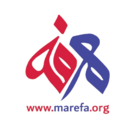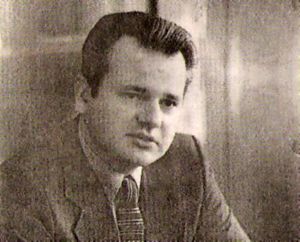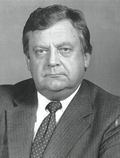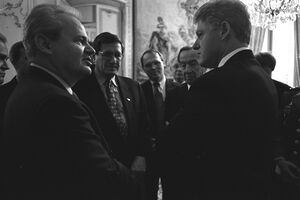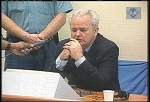سلوبودان ميلوشڤتش
- عنوان هذه المقالة يحتوي الحروف التالية: ڤ وچ. حيثما لا يتواجدوا ويكونوا غير مرغوب فيهم، فإن الاسم يمكن كتابته كالتالي سلوبودان ميلوشفتش.
| سلوبودان ميلوشڤـِتش Слободан Милошевић Slobodan Milošević | |
|---|---|
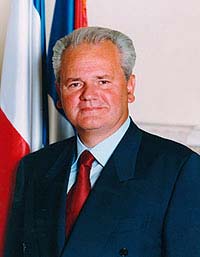
| |
| رئيس جمهورية يوغوسلاڤيا الاتحادية الثالث | |
| في المنصب 23 يوليو 1997 – 5 اكتوبر 2000 | |
| رئيس الوزراء | Radoje Kontić مومير بولاتوڤتش |
| سبقه | زوران ليلتش |
| خلفه | ڤويسلاڤ كوشتونتشا |
| رئيس صربيا الأول | |
| في المنصب 8 مايو 1989 – 23 يوليو 1997 | |
| رئيس الوزراء | دسيمير يڤتتش ستانكو ردميلوڤيتش دراگوتين زلنوڤتش رادومان بوجوڤتش نيكولا شاينوڤيتش ميركو ماريانوڤتش |
| سبقه | منصب مستحدث |
| خلفه | دراگان توميتش (بالإنابة) ميلان ميلوتينوڤتش |
| تفاصيل شخصية | |
| وُلِد | 20 أغسطس 1941 پوجارڤاس، يوغوسلاڤيا |
| توفي | 11 مارس 2003 لاهاي، هولندا |
| القومية | صربي |
| الحزب | الحزب الاشتراكي (صربيا) |
| الدين | ملحد[1] |
| التوقيع | |
سلوبودان ميلوشڤـِتش ( /miːˈlɒsəvɪtʃ/; صربو-كرواتية: [slobǒdan milǒːʃeʋitɕ] (![]() استمع)؛ سيريلية صربية: Слободан Милошевић؛ و. 20 أغسطس 1941 - ت. 11 مارس 2003)، كان سياسياً ورئيس صربيا (كانت جمهورية صربيا الاشتراكية في الأصل جمهورية تأسيسية ضمن جمهورية يوغوسلاڤيا الاتحادية الاشتراكية) ورئيس يوغوسلاڤيا من الفترة بين 1989 حتى 1997. كما قاد الحزب الاشتراكي الصربي منذ تأسيسه عام 1990. تولى السلطة كرئيساً لصربيا بعد أن ادعى هو ومؤيدوه الحاجة إلى إصلاح الدستور اليوغوسلاڤي لعام 1974 بسبب تهميش صربيا وعجزها السياسي عن ردع الاضطرابات الانفصالية الألبانية في إقليم كوسوڤو الصربي.
استمع)؛ سيريلية صربية: Слободан Милошевић؛ و. 20 أغسطس 1941 - ت. 11 مارس 2003)، كان سياسياً ورئيس صربيا (كانت جمهورية صربيا الاشتراكية في الأصل جمهورية تأسيسية ضمن جمهورية يوغوسلاڤيا الاتحادية الاشتراكية) ورئيس يوغوسلاڤيا من الفترة بين 1989 حتى 1997. كما قاد الحزب الاشتراكي الصربي منذ تأسيسه عام 1990. تولى السلطة كرئيساً لصربيا بعد أن ادعى هو ومؤيدوه الحاجة إلى إصلاح الدستور اليوغوسلاڤي لعام 1974 بسبب تهميش صربيا وعجزها السياسي عن ردع الاضطرابات الانفصالية الألبانية في إقليم كوسوڤو الصربي.
تميزت رئاسة ميلوشڤيتش لصربيا وجمهورية يوغسلاڤيا الاتحادية بالعديد من الإصلاحات الكبرى في الدستور الصربي منذ الثمانينيات حتى التسعينيات والتي خفضت من سلطات المقاطعات ذاتية الحكم في صربيا. عام 1990 انتقلت صربيا من نظام الحزب الواحد التيتوي إلى نظام التعددية الحزبية وبمحاولات لإصلاح الدستوري اليوغسلاڤي لعام 1974. في خضم الحروب المشتعلة انقسمت الجمهوريات المؤسسة ليوغسلاڤيا، وتأسست جمهورية يوغسلاڤيا الاتحادية بدمج جمهوريتي صربيا والجبل الأسود السابققتين. شارك ميلوشڤيتش في مفاوضاات اتفاقية دايتون ممثلاً صرب البوسنة، التي أنهت حرب البوسنة عام 1995.
أثناء قصف الناتو ليوغسلاڤيا 1999، اتهمت المحكمة الجنائية الدولية ليوغسلاڤيا السابقة ميلوشڤيتش بارتكاب جرائم حرب أثناء حروب البوسنة وكرواتيا، وكوسوڤو.[2] استقال ميلوشڤيتش من رئاسة يوغسلاڤيا بعد اندلاع المظاهرات في أعقاب الانتخابات الرئاسية المتنازع عليها التي أجريت في 24 سبتمبر 2000. اعتقتله السلطات الاتحادية اليوغسلاڤية في 31 مارس 2001 بتهمة الفساد، استغلال السلطة، والاختلاس.[3][4] تعثر التحقيق الأولي مع ميلوشڤيتش بسبب عدم وجود أدلة، مما دفع رئيس الوزراء الصربي زوران دينيتش بتسليمه للمحكمة الجنائية الدولية ليوغسلاڤيا السابقة من أجل محاكمته بارتكاب جرائم حرب.[5] في بداية المحاكمة، أدان ميلوشڤيتش المحكمة باعتبارها غير قانونية لأنها لم تؤسس بموافقة الجمعية العامة للأمم المتحدة؛ ومن ثم رفض توكيل محامي للدفاع عنه.[6] دافع ميلوشڤيتش عنه نفسه طوال المحاكمة التي استمرت خمس سنوات، والتي انتهت بإسقاط الدعوة عندما توفي في زنزانته في لاهاي، في 11 مارس 2006.[7] توفي ميلوشڤيتش الذي كان يعاني من أمراض القلب وفرض ضغط الدم، بالسكتة القلبية.[8][9] أنكرت المحكمة أي مسؤولية عن وفاة ميلوشڤيتش وذكرت أنه رفض تناول الأدوية الموصوفة وكان يعالج نفسه بدلاً من ذلك.[10]
بعد وفاة ميلوشڤتش، أصدرت محكمة العدل الدولية حكمها بشكل منفصل في قصية الإبادة الجماعية البوسنية الذي يقضي بعدم وجود دليل يربط بين ميلوشڤتش والإبادة الجماعية التي ارتكبتها قوات صرب البوسنة أثناء حرب البوسنة. ومع ذلك، فقد وجدت المحكمة أن إخفاق ميلوشڤيتش والآخرين في صربيا في منع وقوع الإبادة الجماعية وعدم تعاونهم مع المحكمة الجنائية الدولية ليوغسلاڤيا السابقة في عقاب الجناة، وخاصة الجنرال راتكو ملاديتش، وانتهاكهم الالتزام بالامتثال للتدابير المؤقتة التي أمرت بها المحكمة، يعد خرقاً لاتفاقية الإبادة الجماعية.[11][12] وصف المراقبون حكم ميلوشڤيتش بأنه سلطوياً أو استبدادياً.[13]
. . . . . . . . . . . . . . . . . . . . . . . . . . . . . . . . . . . . . . . . . . . . . . . . . . . . . . . . . . . . . . . . . . . . . . . . . . . . . . . . . . . . . . . . . . . . . . . . . . . . . . . . . . . . . . . . . . . . . . . . . . . . . . . . . . . . . . . . . . . . . . . . . . . . . . . . . . . . . . . . . . . . . . . .
النشأة
ترجع أصول ميلوشڤيتش من قرية لييڤا ريكا في پودگوريتسا، من قبيلة ڤاسويڤيتشي من الجبل الأسود. وُلد ميلوشڤيتش في پوجارڤاتس، بعد أربعة أشهر من غزو قوى المحور لمملكة يوغسلاڤيا، ونشأ أثناء فترة احتلال من قبل قوى المحور في الحرب العالمية الثانية. لاحقاً، أصبح أخاه الأكبر بوريسلاڤ دبلوماسياً.[14][15] انفصل والداه في أعقاب الحرب. والده، عالم اللاهوت الأرثوذكسي الصربي[16] سڤتوزار ميلوشوڤيتش، انتحر عام 1962.[17] كان سيمون، والد سڤتوزار، ضابطاً في جيش الجبل الأسود. وكانت ستانيسلاڤا، والده ميلوشوڤيتش، (اسمها قبل الزواج كولينشيتش)، معلمة في مدرسة وكانت عضواً ناشطاً في الحزب الشيوعي، وانتحرت عام 1972.[18] أخاها ميليساڤ كولينشيتش ميجور-جنرال في الجيش الشعبي اليوغسلاڤي، انتحر عام 1963.
انتقل ميلوشوڤيتش لدراسة القانون في كلية الحقوق بجامعة بلگراد، حيث أصبح رئيساً للجنة الأيديولجية لفرع الطلبة للعصبة الشيوعية اليوغسلاڤية. عندما كان في الجامعة، كان صديقاً لإيڤان ستامبوليتش، الذي كان عمه پيتر ستامبوليتش رئيساً للمجلس التنفيذي الصربي (المنصب الشيوعي المكافئ لرئيس الوزراء). كان هذا دليلاً على وجود صلة حاسمة لآفاق ميلوشڤيتش المهنية، حيث رعى ستامبوليتش صعوده عبر التسلسل الهرمي لعصبة الشيوعييين اليوغسلاڤ.
بعد تخرجه عام 1966، أصبح ميلوشڤيتش مستشاراً اقتصادياً لعمدة بلگراد برانكو پشيتش. بعد خمسة سنوات، تزوج من صديقة طفولته، ماريانا ماركوڤيتش، وأنجبا طفلين: ماركو وماريا. كان لماركوميلوشڤيتشيتش بعض التأثير على مسيرة ميلوشڤيتش المهنية سواء قبل أو بعد ارتقاؤه السلطة؛ كما كانت زعيمة شريكة لتحالف زوجها الناشئ، اليسار اليوغسلاڤي في فترة التسعينيات. عام 1968، حصل ميلوشڤيتش على وظيفة في شركة تكنوگاز، حيث كان يعمل ستامبوليتش، وأصبح رئيساً للشركة عام 1973. بحلول 1978، بفضل رعاية ستامبوليتش تمكن ميلوشڤيتش من أن يصبح رئيساً لبيوبانكا، من أكبر البنوك في يوغسلاڤيا؛ منحته رحلاته المتكررة إلى پاريس ونيويورك الفرصة لتعلم اللغة الإنگليزية. كان طوله 186 سم.[19]
الصعود إلى السلطة
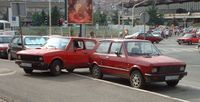
منذ 1984، قبيل انهيار يوغوسلاڤيا، عمل ميلوشڤتش رئيساً لشركة زستاڤا للسيارات. وفي 1986 قام بتعيين الدبلوماسي الأمريكي لورنس إيگلبرگر رئيساً لفرع الشركة في الولايات المتحدة "زستاڤا أمريكا" وشهدت الفترة طرح السيارة يوگو (من زستاڤا) في الأسواق الأمريكية، وكان ذلك حدثاً استثنائياً فهذا المقاس من السيارات كان لا يُطرح في الولايات المتحدة لعدم استيفائه المتطلبات الأمريكية لسلامة السيارات. لورنس إيگلبرگر انتقل مباشرة من العمل في زستاڤا تحت رئاسة ميلوشڤتش إلى منصب سفير الولايات المتحدة في يوغوسلاڤيا (1977-1980)، في عهد آخر رؤسائها سلوبودان ميلوشڤتش وجيمي كارتر. وقد نشر إيگلبرگر مقالاً في صحيفة النيويورك تايمز أثناء عمله سفيراً في يوغوسلاڤيا كتب فيه أن العالم لن يتفاجأ لو تفككت يوغوسلاڤيا إلى مكوناتها الأصلية. وبعد تلك المقالة بشهور بدأت أحداث تفكك يوغوسلاڤيا.[20] ثم عمل في الفترة 1989-1992 مستشاراً للشئون اليوغوسلافية في البيت الأبيض، حيث رأى الكثير أنه ميال للصرب، وخصوصاً عندما أدلى بحديث صحفي نفى فيه أن يكون الجيش الصربي قد اقترف أي مذابح أو مخالفات في كرواتيا المنفصلة. وهو ما دفع الصحافة الاوروبية أن تطلق عليه لقب "لورنس الصرب" Lawrence of Serbia [21] في إشارة إلى لورنس العرب Lawrence of Arabia.
الثورة ضد البيروقراطية
Starting in 1988, the anti-bureaucratic revolution led to the resignation of the governments of Vojvodina and Montenegro and to the election of officials allied with Milošević. According to the ICTY indictment against Milošević: "From July 1988 to March 1989, a series of demonstrations and rallies supportive of Slobodan Milošević's policies – the 'Anti-Bureaucratic Revolution' – took place in Vojvodina and Montenegro. These protests led to the ousting of the respective provincial and republican governments; the new governments were then supportive of, and indebted to, Slobodan Milošević."[22]
Milošević's supporters say the anti-bureaucratic revolution was an authentic grass-roots political movement. Reacting to the indictment, Dr. Branko Kostić, Montenegro's then-representative on the Yugoslav state presidency said, "Well, it sounds like nonsense to me. If a government or a leadership were supportive of Milošević, then it would be normal for him to feel indebted to them, not the other way around." He said Milošević enjoyed genuine grassroots support because "his name at that time shone brightly on the political arena of the entire federal Yugoslavia ... and many people saw him as a person who would be finally able to make things move, to get things going."[23] Kosta Bulatović, an organizer of the anti-bureaucratic rallies, said "All of this was spontaneous"; the motivation to protest was "coming from the grassroots."[24]
Milošević's critics claim that he cynically planned and organized the anti-bureaucratic revolution to strengthen his political power. Stjepan Mesić, who served as the last president of a united Yugoslavia (in the prelude of these events), said that Milošević, "with the policy he waged, broke down the autonomous [government in] Vojvodina, which was legally elected, [and] in Montenegro he implemented an anti-bureaucratic revolution, as it's called, by which he destroyed Yugoslavia."[25] Commenting on Milošević's role, Slovene president Milan Kučan said, "none of us believed in Slovenia that these were spontaneous meetings and rallies."[26] He accused the Serbian government of deliberately fanning nationalist passions, and Slovene newspapers published articles comparing Milošević to Italian Fascist dictator Benito Mussolini, a one-time socialist who turned to nationalism. Milošević contended that such criticism was unfounded and amounted to "spreading fear of Serbia".[27]
In Vojvodina, where 54 percent of the population was Serb, an estimated 100,000 demonstrators rallied outside the Communist Party headquarters in Novi Sad on 6 October 1988 to demand the resignation of the provincial leadership. The majority of protesters were workers from the town of Bačka Palanka, 40 kilometres west of Novi Sad. They were supportive of Milošević and opposed the provincial government's moves to block forthcoming amendments to the Serbian constitution.[28][29][30] The New York Times reported that the demonstrations were held "with the support of Slobodan Milošević" and that "Diplomats and Yugoslavs speculated about whether Mr. Milošević, whose hold over crowds [was] great, had had a hand in organizing the Novi Sad demonstrations."[31] The demonstrations were successful. The provincial leadership resigned, and Vojvodina League of Communists elected a new leadership.[32] In the elections that followed Dr. Dragutin Zelenović, a Milošević ally, was elected member of the SFRY Presidency from Vojvodina[33]
On 10 January 1989, the anti-bureaucratic revolution continued in Montenegro, which had the lowest average monthly wage in Yugoslavia, an unemployment rate of nearly 25 percent, and where one-fifth of the population lived below the poverty line. 50,000 demonstrators gathered in the Montenegrin capital of Titograd (now Podgorica) to protest the republic's economic situation and to demand the resignation of its leadership.[34]
The next day, Montenegro's state presidency tendered its collective resignation along with the Montenegrin delegates in the Yugoslav Politburo. Montenegro's representative on the federal presidency, Veselin Đuranović, said the decision to step down "was motivated by a sense of responsibility for the economic situation."[35][36]
Demonstrators were seen carrying portraits of Milošević and shouting his name, but the New York Times reported "there is no evidence that the Serbian leader played an organizing role" in the demonstrations.[37]
Multiparty elections were held in Montenegro for the first time after the anti-bureaucratic revolution. Nenad Bućin, an opponent of Milošević's policies, was elected Montenegro's representative on Yugoslavia's collective presidency,[38] and Momir Bulatović, a Milošević ally, was elected Montenegrin President.[39][40]
التعديلات الدستورية في صربيا ويوغوسلافيا 1989-1992
Beginning in 1982 and 1983, in response to nationalist Albanian riots in Kosovo, the Central Committee of the SFRY League of Communists adopted a set of conclusions aimed at centralizing Serbia's control over law enforcement and the judiciary in its Kosovo and Vojvodina provinces.[41]
In the early to mid-1980s, claims were made of a mass exodus of Serbs and Montenegrins from Kosovo as a result of Albanian riots.[42] Serbian nationalists denounced the 1974 Yugoslav constitution and demands for change were strong among Kosovo Serbs.[42] In 1986, Serbian President Ivan Stambolić responded by accepting this position, declaring that the 1974 constitution was contrary to the interests of Serbs, though he warned that "certain individuals" were "coquetting" with Serbian nationalism.[42] Stambolić established a commission to amend the Serbian constitution in keeping with conclusions adopted by the federal Communist Party.[41]
The constitutional commission worked for three years to harmonize its positions and in 1989 an amended Serbian constitution was submitted to the governments of Kosovo, Vojvodina and Serbia for approval. On 10 March 1989, the Vojvodina Assembly approved the amendments, followed by the Kosovo Assembly on 23 March, and the Serbian Assembly on 28 March.[43][44][45]
In the Kosovo Assembly 187 of the 190 assembly members were present when the vote was taken: 10 voted against the amendments, two abstained, and the remaining 175 voted in favor of the amendments.[41][46] Although the ethnic composition of the Kosovo Assembly was over 70 percent Albanian,[41] they were forced to vote in favor of the amendments while under the careful watch of the newly arrived Serbian police forces. Unrest began when amendments were approved restoring Serbian control over the province's police, courts, national defence and foreign affairs. According to a United Press report, rioting killed 29 people and injured 30 policemen and 97 civilians.[47]
In the wake of the unrest following the 1989 constitutional amendments, ethnic Albanians in Kosovo largely boycotted the provincial government and refused to vote in the elections.[48][49] Azem Vllasi, leader of the League of Communists of Kosovo, was arrested for inciting rioting amid the 1989 strike by Kosovo-Albanian miners.[50] In the wake of the Albanian boycott, supporters of Slobodan Milošević were elected to positions of authority by the remaining Serbian voters in Kosovo.[بحاجة لمصدر] The boycott soon included education on Albanian language in Kosovo which Milošević attempted to resolve by signing the Milošević-Rugova education agreement in 1996.[بحاجة لمصدر]
The anti-bureaucratic revolutions in Montenegro and Vojvodina coupled with the Albanian boycott in Kosovo effectively meant that Slobodan Milošević and his supporters held power in four out of the eight republics and autonomous provinces that made-up the Yugoslav federation. Whether this was cynically engineered by Milošević is a matter of controversy between his critics and his supporters.[بحاجة لمصدر]
Because Milošević's supporters controlled half of the votes in the SFRY presidency, his critics charge that he undermined the Yugoslav federation. This, his detractors argue, upset the balance of power in Yugoslavia and provoked separatism elsewhere in the federation. Milošević's supporters contend that the representatives of the SFRY presidency were elected according to the law. They say that Milošević enjoyed genuine popular support so it was perfectly logical for his allies to be elected to the presidency. His supporters dismiss allegations that he upset the balance of power in Yugoslavia as a propaganda ploy designed to justify separatism.[بحاجة لمصدر]
In 1990, after other republics abandoned the League of Communists of Yugoslavia and adopted democratic multiparty systems, Milošević's government quickly followed suit and the 1990 Serbian Constitution was created. The 1990 Constitution officially renamed the Socialist Republic of Serbia to the Republic of Serbia and abandoned the one-party communist system and created a democratic multiparty system.
After the creation of a multiparty system in Serbia, Milošević and his political allies in Serbia elsewhere in Yugoslavia pushed for the creation of a democratic multiparty system of government at the federal level, such as Serbian state media appealing to the citizens of Bosnia and Herzegovina in early 1992 with the promise that Bosnia and Herzegovina could peacefully coexist in a democratic Yugoslav federation alongside the republics of Serbia and Montenegro.[51] In the aftermath, Serbia and Montenegro agreed to create the new Yugoslav federation called the Federal Republic of Yugoslavia in 1992, which dismantled the remaining communist infrastructure and created a federal democratic multiparty system of government.
السياسات الاقتصادية
Milošević's advocated a synthesis of socialist and liberal economic policies that would gradually transition Serbia from a planned economy to a mixed economy.[52][53] During the first democratic election in Serbia, Milošević promised to protect industrial workers from the adverse effects of free market policies by maintaining social ownership of the economy and supporting trade barriers in order to protect local industries.[54] Despite this, many accused Milošević of creating a kleptocracy by transferring ownership much of the industrial and financial sector to his political allies and financiers.[55] Under heavy economic sanctions from the United Nations due to Milošević's perceived role in the Yugoslav wars, Serbia's economy began a prolonged period of economic collapse and isolation. The National Bank of FR Yugoslavia's war-related easy money policies contributed to hyperinflation which reached an alarming rate of 313 million percent in January 1994.[56] According to the World Bank, Serbia's economy contracted by 27.2 and 30.5 percent in 1992 and 1993 respectively. In response to the deteriorating situation, World Bank economist Dragoslav Avramović was nominated the governor of the National Bank of the FR Yugoslavia in March 1994. Avramović began monetary reforms that ended hyperinflation and returned the Serbian economy to economic growth by giving the Yugoslav Dinar a 1:1 parity with the Deutsche Mark. Milošević's role in the signing of the Dayton Accords allowed the lifting of most economic sanctions, but the FR Yugoslavia was still not allowed access to financial and foreign aid due to the perceived oppression of Albanians in Kosovo. The Serbian economy began growing from the period of 1994–1998, at one point even reaching a growth rate of 10.1 percent in 1997. However, this growth rate was not sufficient enough to return Serbia to its pre-war economic status. In order to pay out pensions and wages, Milošević's socialist government had no choice but to begin selling off Serbia's most profitable telecommunications, which gave the federal government about $1.05 billion more in revenue.[57] In 1998, Miloševic promised to introduce a new economic program which would begin a process of market reforms, reduction of trade barriers, and the privatization of more state owned enterprises in order to achieve an economic growth rate of 10%.[58] However, this plan was never implemented due to the Kosovo war, the NATO bombing of Yugoslavia, and his subsequent overthrow in October 2000.
. . . . . . . . . . . . . . . . . . . . . . . . . . . . . . . . . . . . . . . . . . . . . . . . . . . . . . . . . . . . . . . . . . . . . . . . . . . . . . . . . . . . . . . . . . . . . . . . . . . . . . . . . . . . . . . . . . . . . . . . . . . . . . . . . . . . . . . . . . . . . . . . . . . . . . . . . . . . . . . . . . . . . . . .
الحقوق المدنية والسياسية في صربيا ويوغسلاڤيا تحت حكم ميلوشڤتش
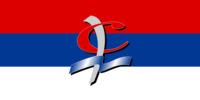
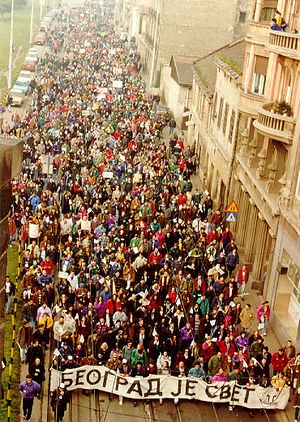
Milošević's government policies on civil and political rights when serving as Serbian President and later Yugoslav president were controversial.
Milošević's government exercised influence and censorship in the media. An example was in March 1991, when Serbia's Public Prosecutor ordered a 36-hour blackout of two independent media stations, B92 Radio and Studio B television to prevent the broadcast of a demonstration against the Serbian government taking place in Belgrade.[59] The two media stations appealed to the Public Prosecutor against the ban but the Public Prosecutor failed to respond.[59]
Upon the creation of the Federal Republic of Yugoslavia, Milošević's government engaged in reforms to the Serbian penal code regarding restrictions on free speech, which were seen by critics as highly authoritarian. In particular Article 98 of the Serbian penal code during the 1990s punished imprisonment of up to three years for the following:
...public ridicule [of] the Republic of Serbia or another Republic within the Federal Republic of Yugoslavia, their flag, coat of arms or anthem, their presidencies, assemblies or executive councils, the president of the executive council in connection with the performance of their office..."[59]
The federal criminal code for Yugoslavia also protected the presidents of federal institutions, the Yugoslav Army and federal emblems.[59] Both the Serbian and federal Yugoslav laws granted limited exemptions to journalists.[59] The result was multiple charges against a variety of people opposed to the policies of the Serbian and Yugoslav governments even including a Serbian cartoonist who designed political satire.[60]
دوره في الحروب اليوغسلاڤية
The Hague indictment alleges that, starting in 1987, Milošević "endorsed a Serbian nationalist agenda" and "exploited a growing wave of Serbian nationalism in order to strengthen centralised rule in the SFRY".[22] ICTY prosecutors argued that "the (Croatia, Bosnia, and Kosovo) indictments were all part of a common scheme, strategy or plan on the part of the accused Milošević to create a Greater Serbia, a centralized Serbian state encompassing the Serb-populated areas of Croatia and Bosnia and all of Kosovo, and that this plan was to be achieved by forcibly removing non-Serbs from large geographical areas through the commission of the crimes charged in the indictments. Although the events in Kosovo were separated from those in Croatia and Bosnia by more than three years, they were no more than a continuation of that plan, and they could only be understood completely by reference to what had happened in Croatia and Bosnia."[61] Milošević's defenders claim that the Prosecution could not produce a single order issued by his government to Serbian fighters in Croatia or Bosnia. Near the end of the Prosecution's case, a Prosecution analyst admitted under cross-examination that this was indeed the case. Theunens, however, was quick to point out, "the fact that we don't have orders doesn't mean that they don't exist" to which Milošević replied "There are none, that's why you haven't got one."[62]
Milošević's political behavior has been analyzed as politically opportunist in nature.[63] Claims that Milošević was principally motivated by a desire for power have been supported by many people who had known or had worked for him.[64] Some believe his original goal until the breakup of Yugoslavia was to take control of Yugoslavia, with the ambition of becoming its next great leader, a "second Tito".[63][65] According to this, Milošević exploited nationalism as a tool to seize power in Serbia, while not holding any particular commitment to it.[64] During the first twenty-five years of his political career in the communist government of Yugoslavia, Milošević was a typical civil servant who did not appear to have nationalist aims.[64] Later, he attempted to present himself as a peacemaker in the Yugoslav Wars and abandoned support of nationalism.[64] He returned to support nationalism during the Kosovo War and appealed to anti-imperialist sentiments.[64] The spread of violent nationalism has also been imputed to indifference to it by Milošević.[66]
The source of Milošević's nationalistic agenda is believed to have been influenced by the policies of the popular prominent Serbian Communist official and former Yugoslav Partisan Aleksandar Ranković who was known to promote Serbian national interests in Yugoslavia and tougher police actions against ethnic Albanians in Kosovo.[67] He supported a centralized Yugoslavia and opposed efforts that promoted decentralization that he deemed to be against the interests of Serb unity.[68] Ranković imposed harsh repressive measures on Kosovo Albanians based on accusations that they there were sympathizers of the Stalinist rule of Enver Hoxha in Albania.[69] In 1956, a show trial in Pristina was held in which multiple Albanian Communists of Kosovo were convicted of being infiltrators from Albania and were given long prison sentences.[69] Ranković sought to secure the position of the Serbs in Kosovo and gave them dominance in Kosovo's nomenklatura.[65] Under Ranković's influence, Islam in Kosovo at this time was repressed and both Albanians and ethnically Slavic Muslims were encouraged to declare themselves to be Turkish and emigrate to Turkey.[69] At the same time, Serbs and Montenegrins dominated the government, security forces, and industrial employment in Kosovo.[69] The popularity of Ranković's nationalistic policies in Serbia became apparent during his funeral in Serbia in 1983 where large numbers of people attended while considering Ranković a Serbian "national" leader.[67] This event is believed to have possibly influenced Milošević, who attended Ranković's funeral, to recognize the popularity of Ranković's agenda.[67] This connection to the legacy of Ranković was recognized by a number of Yugoslavs who regarded Milošević's policies upon his to power in Serbia as effectively "bringing Ranković back in".[70]
During the Anti-Bureaucratic Revolution, Milošević urged Serbians and Montenegrins to "take to the streets" and utilized the slogan "Strong Serbia, Strong Yugoslavia" that drew support from Serbs and Montenegrins but alienated the other Yugoslav nations.[71] To these groups, Milošević's agenda reminded them of the Serb hegemonic political affairs of the Kingdom of Yugoslavia and Ranković's policies.[71] Milošević appealed to nationalist and populist passion by speaking of Serbia's importance to the world and in a Belgrade speech on 19 November 1988, he spoke of Serbia as facing battles against both internal and external enemies.[71] In Vojvodina, a mob of pro-Milošević demonstrators that included 500 Kosovo Serbs and local Serbs demonstrated at the provincial capital, accusing the leadership in Vojvodina of supporting separatism and for being "traitors".[72] In August 1988, meetings by supporters of the Anti-Bureaucratic Revolution were held in many locations in Serbia and Montenegro, with increasingly violent nature, with calls being heard such as "Give us arms!", "We want weapons!", "Long live Serbia—death to Albanians!", and "Montenegro is Serbia!"[73] In the same month, Milošević began efforts designed to destabilize the governments in Montenegro and Bosnia and Herzegovina to allow him to install his followers in those republics.[73] By 1989, Milošević and his supporters controlled Central Serbia along with the autonomous provinces of Kosovo and Vojvodina, supporters in the leadership of Montenegro, and agents of the Serbian security service were pursuing efforts to destabilize the government in Bosnia & Herzegovina.[74] The new government of Montenegro led by Momir Bulatović was seen by some as a satellite of Serbia.[75][76][77] In 1989, the Serbian media began to speak of "the alleged imperilment of the Serbs of Bosnia and Herzegovina", as tensions between Serbs, Bosniaks and Croats increased over Serb support for Milošević.[78] Efforts to spread the cult of personality of Milošević into the republic of Macedonia began in 1989 with the introduction of slogans, graffiti, and songs glorifying Milošević.[78] Furthermore, Milošević proposed a law to restore land titles held by Serbs in the interwar period that effectively provided a legal basis for large numbers of Serbs to move to Kosovo and Macedonia to regain those lands.[78] Beginning in 1989, Milošević gave support to Croatian Serbs who were vouching for the creation of an autonomous province for Croatian Serbs, which was opposed by Croatian communist authorities.[79] In the late 1980s, Milošević allowed the mobilization of Serb nationalist organizations to go unhindered by actions from the Serbian government, with Chetniks holding demonstrations, and the Serbian government embracing the Serbian Orthodox Church and restored its legitimacy in Serbia.[80]
Croatia and Slovenia denounced Milošević's actions and began to demand that Yugoslavia be made a full multi-party confederal state.[78] Milošević claimed that he opposed a confederal system but also declared that a confederal system be created, with the external borders of Serbia being an "open question".[81] Tensions between the republics escalated to crisis beginning in 1988, with Slovenia accusing Serbia of pursuing Stalinism while Serbia accused Slovenia of betrayal.[82] Serbs boycotted Slovene products and Belgraders began removing their savings from the Slovenian Bank of Ljubljana.[82] Slovenia accused Serbia of persecuting Kosovo Albanians and declared its solidarity with the Kosovo Albanian people while Milošević in turn, accused Slovenia of being a "lackey" of Western Europe.[82] In response to the escalating tensions, Croatia expressed support for Slovenia, Bosnia and Herzegovina declared its neutrality, while Montenegro supported Serbia.[83] Slovenia reformed its constitution in 1989 that declared Slovenia's right to secession. These changes provoked accusations by the Serbian media that the changes were "destabilizing".[83] Serbia's response was a plan to hold demonstrations in Ljubljana with 30,000 to 40,000 Serbs to supposedly inform Slovenes about the situation in Kosovo, while this was suspected to be an action aimed at destabilizing the Slovene government.[83] Croatia and Slovenia prevented the Serb protesters from crossing by train into Slovenia.[83] Serbia responded by breaking political links between the two republics and 329 Serbian businesses broke ties with Slovenia.[83] With these events in 1989, nationalism soared in response along with acts of intolerance, discrimination, and ethnic violence increasing.[83] In that year, officials from Bosnia and Herzegovina noted rising tensions between Bosniaks, Croats, and Serbs; active rumors spread of incidents between Croats and Serbs and arguments by Croats and Serbs that Bosniaks were not a real nation escalated.[84]
With the collapse of the Yugoslav Communist Party, multiparty elections were held in Serbia in 1990, with a number of nationalist parties running on the agenda of creating a Greater Serbia as Yugoslavia fell apart.[85] From 1990 onward, as Serbs in Croatia pushed for autonomy and began to arm themselves, the Serbian state-run newspaper Politika denounced the Croatian government of Franjo Tuđman for allegedly "trying to restore the World War II-era Ustaše regime" and for "copying Tito", and pledged that Belgrade would support the Serbs of Croatia.[81] The Yugoslav People's Army (JNA) began providing weapons to the Serbs in Croatia while the situation in Belgrade grew more intense as Serbs demonstrated outside of the parliament, shouting "We want arms" and "Let's go to Croatia!".[79]
Milošević and other members of the Serbian leadership in the 1980s attempted to gain support among Serb nationalists by appealing to revisionism of the history of Yugoslavia in World War II. To do this, the Tito-era tradition of focusing on rallying the population of Yugoslavia in remembering the total casualties of Yugoslavs in World War II at the hands of Axis forces was replaced with the Milošević government's focus on remembering the Serb casualties of World War II as victims of the Croatian Ustaše.[86] This attempt to gain nationalist support also had the effect of increasing the radicalization of Serbian nationalism.[86] In the late 1980s, conspiracy theories that vilified the Roman Catholic Church began to become widespread and were supported by Serbian publishers. This was of particular significance since these were attacks on the national religion of the Croats.[80] The political climate in Serbia and Serb territories fostered the rise of ultranationalism and created tense and, at times, violent confrontations between Serbs themselves, particularly between nationalist Serbs and non-nationalist Serbs. Serbs who publicly opposed the nationalist agenda were reported to have been harassed, threatened, or killed.[87]
The Serbian media during Milošević's era was known to espouse Serb nationalism and patriotism,[88] while promoting xenophobia toward the other ethnicities in Yugoslavia.[89] Ethnic Albanians were commonly characterised in the media as anti-Yugoslav counter-revolutionaries, rapists, and a threat to the Serb nation.[90] The Serbian state-run newspaper Politika had a number of xenophobic headlines such as in 1991, saying "The Šiptars [Albanians] are watching and waiting".[91] The newspaper also attacked Croats for the election of Franjo Tuđman as president, saying that the "Croatian leadership again shames the Croatian people".[92] It attempted to assert that Croats and ethnic Albanians were cooperating in a campaign against the Serbian government during the 1991 protests in Belgrade against Milošević's government, denying that Serbs took part in the protest while claiming "it was the Šiptars and Croats who demonstrated".[92] When war erupted in Croatia, Politika promoted Serb nationalism, hostility towards Croatia, and violence, and on 2 April 1991, the newspaper's headline read "Krajina decides to join Serbia". One of the newspaper's stories was "Serbian unity—saving Krajina".[93] On 5 June 1991, Politika ekpres ran a piece titled "Serbs must get weapons". On 25 June 1991 and 3 July 1991, Politika began to openly promote partitioning Croatia, saying "We can't accept Croatia keeping these borders", "Krajina in the same state with Serbia, Montenegro, and Bosnia-Herzegovina", and prominently quoted Jovan Marjanović of the Serbian Renewal Movement, who said "The [Yugoslav] Army must come into Croatia and occupy the line Benkovac-Karlovac-Pakrac-Baranja", which would essentially have occupied almost all of Croatia and all the territories in Croatia that were claimed by nationalist promoters of a Greater Serbia.[94] To promote fear and anger among Serbs towards Croatia, on 25 June 1991, Politika reminded Serbs about the atrocities by the Croatian fascist Ustaše against Serbs during World War II by saying "Jasenovac [an Ustase concentration camp in World War II] mustn't be forgotten".[95] According to Borisav Jović, who was formerly a close Milošević ally, Milošević exercised media censorship and maintained strong personal influence over Serbia's state media outlets, having "personally appointed editors-in-chief of newspapers and news programs ..."[96] Serbian state media during the wars featured controversial reportage that villainized the other ethnic factions. In one such program, a Croatian Serb woman denounced the old "communist policy" in Croatia, claiming that under it "[t]he majority of Serbs would be assimilated in ten years",[97] while another interviewee stated "Where Serbian blood was shed by Ustaša knives, there will be our boundaries."[97] Various Serbian state television reports featured a guest speaker, Jovan Rašković, who claimed that the Croat people had a "genocidal nature".[97] These repeatedly negative media depictions of the opposing ethnic factions have been said to have been examples of Milošević's state media promoting fear-mongering and utilizing xenophobic nationalist sentiments to draw Serbs to support the wars.[97] The director of Radio Television of Serbia during Milošević's era, Dušan Mitević, has since admitted on a PBS documentary "the things that happened at state TV, warmongering, things we can admit to now: false information, biased reporting. That went directly from Milošević to the head of TV.[98]
Milošević was uninterested in maintaining Slovenia within the Yugoslav federation, as Slovenia had very few Serbs living within it and Milošević suggested a political deal with Slovene president Kučan, Serbia would recognize the right of the self-determination of the Slovene nation to independence if Slovenia in turn recognized the right of self-determination of the Serb nation to remain united with Serbia.[99] Such a deal would have set a precedent for Serbs in Bosnia and Croatia to remain in one state with Serbia.[99] Milošević's ally in the Yugoslav federal government, Borisav Jović stated "I put it bluntly. We didn't want a war with Slovenia. Serbia had no territorial claims there. It was an ethnically-pure republic – no Serbs. We couldn't care less if they left Yugoslavia ... We would have been overstretched. With Slovenia out of the way, we could dictate terms to the Croats."[100]
Milošević rejected the independence of Croatia in 1991, and even after the formation of the Federal Republic of Yugoslavia (FRY), it too did not initially recognize Croatia's independence.[101] Plans by Milošević to carve out territory from Croatia to the local Serbs had begun by June 1990, according to the diary of Borisav Jović.[102] The Serbian government along with a clique of pro-Milošević members of the Yugoslav army and its general staff, secretly adopted the RAM or "frame" plan that involved the partition of Croatia and Bosnia to give large amounts of territory to the local Serbs that would remain united with Serbia, effectively a Greater Serbia.[103] Armaments and military equipment were placed in strategic positions throughout Croatia and Bosnia for use by the Serbs and local Serbs were trained as police and paramilitary soldiers in preparation for war.[102] Milošević was less interested in annexing the Serb breakaway republic of Krajina.[104] According to testimony by Krajina's former President Milan Babić, Milošević had abandoned plans of having "all Serbs in one state" by March 1991 when he met with Croatian President Franjo Tuđman and discussed the partition of Bosnia.[104] Babić attended the meeting and noted that Milošević stated that "Tuđman needs Bihać" – a city in Bosnia that was separated by Serbian Krajina from Croatian government-controlled territory in Croatia; and then added "He needs a road between Benkovac and Drniš as well" that would involve the road going through territory claimed by Krajina.[104]
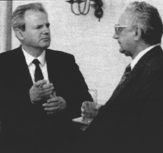
Upon the Yugoslav republic of Macedonia seceding in 1991, the Yugoslav government declared Macedonia an "artificial nation" and it allied with Greece against the country, even suggesting a partition of the Republic of Macedonia between Yugoslavia and Greece.[105] Subsequent interviews with government officials involved in these affairs have revealed that Milošević planned to arrest the Republic of Macedonia's political leadership and replace it with politicians loyal to him.[105] Milošević demanded the self-determination of Serbs in the Republic of Macedonia and did not recognize the independence of the Republic of Macedonia until 1996.[105]
Despite the bitterness towards the Macedonian nation whose locals rejected Yugoslav assertions of Serbian ethnicity, the FR Yugoslavia would recognize the Republic of Macedonia in 1996. Four years before this milestone, however, Yugoslav troops and remnants of Belgrade's central government had peacefully and voluntarily left Macedonian territory.[106]
Milošević denounced the declaration of independence of Bosnia and Herzegovina from Yugoslavia in 1992, and said that "Bosnia and Herzegovina was illegally proclaimed as an independent state and recognized. That recognition was like when the Roman Emperor Caligula appointed his horse as a Senator: they recognized a state that never existed before. The Serbs there said, 'We want to stay within Yugoslavia. We don't want to be second-class citizens.' And then the conflicts were started by Muslims, no doubt. And the Serbs, in defending themselves, were always better fighters, no doubt. And they achieved results, no doubt. But please, we were insisting on peace. The international community gave premature recognition first of Slovenia and then of Croatia and supported the independence of Bosnia and Herzegovina on a totally irregular basis."[107] A telephone conversation between Milošević and Bosnian Serb leader Radovan Karadžić in September 1991 talking about the prospects of war in Bosnia and Herzegovina was tapped by Yugoslav intelligence, which reported the transcript to Yugoslav prime minister Ante Marković, who released the transcript to the public to discredit Milošević. The transcript involved Milošević ordering Karadžić to "Go to Uzelac [JNA commander in northern Bosnia], he'll tell you everything. If you have any problems, telephone me", and said "As long as there is the army no one can touch us ... Don't worry about Herzegovina. Momir [Bulatović, Montenegrin leader] said to his men: 'Whoever is not ready to die in Bosnia, step forward five paces.' No one did so."[108] The conversation revealed that Milošević controlled the military strategy for the war in Bosnia and that Montenegro was under his control.[108]
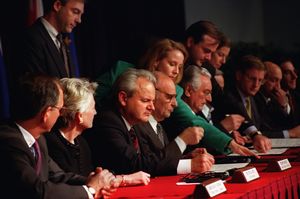
Vojislav Šešelj, leader of the Serbian Radical Party and a Serbian paramilitary leader during the Yugoslav wars, claimed that Milošević was directly involved in supporting his paramilitaries and controlled Serb forces during the wars: "Milošević organized everything. We gathered the volunteers and he gave us a special barracks, Bubanj Potok, all our uniforms, arms, military technology and buses. All our units were always under the command of the Krajina [Serb army] or [Bosnian] Republika Srpska Army or the JNA. Of course I don't believe he signed anything, these were verbal orders. None of our talks was taped and I never took a paper and pencil when I talked with him. His key people were the commanders. Nothing could happen on the Serbian side without Milošević's order or his knowledge."[109]
Although direct orders to commit atrocities by Milošević have never been discovered, he made little or no effort to punish people deemed responsible for such atrocities, including Ratko Mladić who, after being accused of allowing atrocities to occur against Croats in Vukovar, was sent to lead the Army of the Republika Srpska, in which capacity Mladić was accused of ordering atrocities, including the murder of thousands of Bosniak men and boys in Srebrenica. Even after the reports of Srebrenica were released, Milošević refused to accept that Mladić was responsible for the crimes he was accused of. Wesley Clark, who was a member of the US team that helped negotiate the 1995 peace agreement ending the Bosnian War, claimed in his testimony during the trial of Milošević that Milošević had prior knowledge of the Srebrenica Massacre and knew of Mladić's plans.[110] During the negotiations, Clark had asked Milošević: 'Mr. President, you say you have so much influence over the Bosnian Serbs, but how is it then, if you have such influence, that you allowed General Mladić to kill all those people in Srebrenica?' with Milošević answering: 'Well, General Clark ... I warned Mladić not to do this, but he didn't listen to me.'"[110][111]
Following the rise of nationalism and political tensions after Slobodan Milošević came to power, as well as the outbreaks of the Yugoslav Wars, numerous anti-war movements developed in Serbia.[112][113][114][115] The anti-war protests in Belgrade were held mostly because of opposition the Battle of Vukovar, Siege of Dubrovnik and Siege of Sarajevo,[112][114] while protesters demanded the referendum on a declaration of war and disruption of military conscription.[116][117][118] It is estimated that between 50,000 and 200,000 people deserted from the Milošević-controlled Yugoslav People's Army during wars, while between 100,000 and 150,000 people emigrated from Serbia refusing to participate in the war.[116][114] According to professor Renaud De la Brosse, senior lecturer at the University of Reims and a witness called by the ICTY, it is surprising how great the resistance to Milošević's propaganda was among Serbs, given that and the lack of access to alternative news.[119] Political scientists Orli Fridman described that not enough attention was given to anti-war activism among scholars studying the breakup of Yugoslavia and the wars, as well as that independent media and anti-war groups from Serbia did not attract the international attention.[113]
. . . . . . . . . . . . . . . . . . . . . . . . . . . . . . . . . . . . . . . . . . . . . . . . . . . . . . . . . . . . . . . . . . . . . . . . . . . . . . . . . . . . . . . . . . . . . . . . . . . . . . . . . . . . . . . . . . . . . . . . . . . . . . . . . . . . . . . . . . . . . . . . . . . . . . . . . . . . . . . . . . . . . . . .
دوره في حصار سراييڤو
 مقالة مفصلة: حصار سراييڤو
مقالة مفصلة: حصار سراييڤو
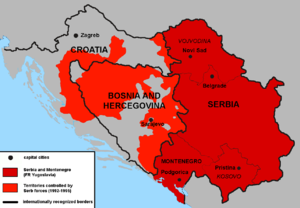
اغتيال معارضيه
في صيف 2000، تم اختطاف الرئيس الصربي السابق إيڤان ستامبوليتش ثم عـُثر على جثته عام 2003. وفي يونيو 2006 حكمت المكمة العليا لصربيا بأن ميلوشڤيتش أمر بقتل ستامبوليتش، كما اتهمه البعض بأنه شخصياً قام بقتل ستامبوليتش في فروشكا گورا.
معظم الاغتيالات راح ضحيتها مسئولين صرب ويوغوسلاڤ، مثل رئيس الشرطة رادوڤان ستويچيچ ووزير الدفاع پاڤله بولاتوڤيتش ورئيس الخطوط الجوية اليوغوسلافية زيكا پتروڤيتش.
آراءه
السقوط
On 4 February 1997, Milošević recognized the opposition victories in some local elections, after mass protests lasting 96 days. Constitutionally limited to two terms as President of Serbia, on 23 July 1997, Milošević assumed the presidency of the Federation, though it had been understood he had held the real power for some time before then.
Serbian police and military counter-action against the pro-Albanian separatist Kosovo Liberation Army in Serbia's previously autonomous province of Kosovo culminated in escalating armed conflict in 1998 and NATO air strikes against Yugoslavia between March and June 1999, ending in full withdrawal of Yugoslav security forces from the province and deployment of international civil and security forces. Milošević was indicted on 24 May 1999 for war crimes and crimes against humanity committed in Kosovo, and he was standing trial, up until his death, at the International Criminal Tribunal for the Former Yugoslavia (ICTY). He asserted that the trial was illegal, having been established in contravention of the UN Charter.[122]
Ironically, Milošević lost his grip on power when he lost elections that he scheduled prematurely (that is, before the end of his mandate) and that he did not even need to win in order to retain power, which was centered in the parliaments that his party and its associates controlled. In the five-man presidential race held on 24 September 2000, Milošević was defeated in the first round by opposition leader Vojislav Koštunica, who won slightly more than 50% of the vote. Milošević initially refused to acquiesce, claiming that no one had won a majority. The Yugoslav constitution called for a runoff between the top two candidates in the event that no candidate won more than 50% of the vote. Official results put Koštunica ahead of Milošević, but at under 50 percent. The internationally financed CeSID claimed otherwise, though its story changed throughout the two weeks between 24 September and 5 October.[بحاجة لمصدر] This led to mass demonstrations in Belgrade on 5 October, known as the Bulldozer Revolution. Milošević was forced to accept this when Yugoslav Army commanders he had expected to support him had indicated that in this instance they would not, and would permit the violent overthrow of the Serbian government.[بحاجة لمصدر] On 6 October, Milošević met with Koštunica and publicly accepted defeat. Koštunica finally took office as Yugoslav president on 7 October following Milošević's announcement.
Milošević was arrested by Yugoslav authorities on 1 April 2001, following a 36-hour armed standoff between police and Milošević's bodyguards at his Belgrade villa. Although no official charges were made, Milošević was suspected of abuse of power and corruption.[123]
Following his arrest, the United States pressured the Yugoslav government to extradite Milošević to the ICTY or lose financial aid from the IMF and World Bank.[123] President Koštunica opposed extradition of Milošević, arguing that it would violate the Yugoslav constitution. Prime Minister Zoran Đinđić called a governmental meeting to issue a decree for extradition.[124] Milošević's lawyers appealed the extradition process to the Yugoslav constitutional court. The court requested two weeks to deliberate the appeal. Ignoring objections from the president and the constitutional court, Đinđić ordered the extradition of Milošević to the ICTY. On 28 June, Milošević was flown by helicopter from Belgrade to a US airbase in Tuzla, Bosnia and Herzegovina and from where he was then flown to The Hague, Netherlands.[124]
The extradition caused political turmoil in Yugoslavia. President Koštunica denounced the extradition as illegal and unconstitutional, while a junior party in the Đinđić coalition government left in protest. Milošević's lawyer, Toma Fila, said the extradition violated the Yugoslav constitutional ban on extradition. Đinđić stated there would be negative consequences if the government did not cooperate. Additionally, the government argued that sending Milošević to the ICTY was not extradition as it is a UN institution and not a foreign country.[124] Following the extradition, a group of donors pledged approximately $1 billion dollars in financial aid to Yugoslavia.[مطلوب توضيح][125]
علاقاته مع الدول الأخرى
العلاقات مع روسيا
Historically, Russia and Serbia have had very close relations, sharing a common Slavic ancestry and Orthodox Christian faith. Russia is remembered by most Serbs for its assistance to Serbia during its uprising and war for independence from the Ottoman Empire in the 19th century. During Milošević's rule, Russia pursued policies that generally supported his policies. During the Kosovo conflict in 1999, some observers suggested the possibility of Russia deploying troops in support of Serbia.[126] Russia has provided political asylum to Milošević's wife and children.[بحاجة لمصدر]
العلاقات مع الصين
Milošević first visited China in the early 1980s while head of Beobank. He visited China again in 1997, after an invitation by Chinese president Jiang Zemin. Milošević was often popularly known in China by the nickname "Lao Mi" (老米�), a shortened form of the informal Chinese-style nickname "Old Milošević" (老米洛舍维奇�); among the state-operated media in China, Milošević was often referred to as "Comrade Milošević" (米洛舍维奇同志). Many sources hold that the Chinese government asserted strong backing of Milošević throughout his presidency until his surrender, and was one of the few countries supportive of him and the Yugoslav government,[127] at a time when most Western countries were strongly critical of the Milošević government. The New York Times states that People's Republic of China was "one of Mr. Milošević's staunchest supporters" during the Kosovo conflict.[128] China vocally opposed NATO armed intervention in Kosovo throughout the campaign. Chinese parliamentary leader Li Peng was presented by Milošević with Yugoslavia's highest medal (the Great Star) in Belgrade in 2000.[128] Marko Milošević, the son of the deposed Milošević, was turned away by China on 9 October 2000. Marko Milošević may have attempted to travel to China because of the £100 million allegedly laundered into Chinese banks by the Milošević family.[129][130]
The New York Times observed that Milošević, and particularly his wife Marković, had "long viewed Beijing and its Communist party" as allies and "the sort of ideological comrades" lacking in Eastern Europe after the fall of Communism in the 1990s.[128] After Milošević's indictment, China's public statements shifted toward emphasizing Yugoslav-Chinese relations rather than focusing on its support for Milošević, while after the election of Vojislav Koštunica as Yugoslav president, Chinese foreign ministry officially stated that "China respects the choice of the Yugoslavian people."[128]
المحاكمة بتهمة جرائم حرب
مكث ميلوشڤيتش سنوات متنقلاً بين السجن والمحكمة والمستشفى، وكان في كل جلسة من جلسات المحاكمة يسخر من قضاته ولا يعترف بشرعية المحكمة، ويرفض توكيل محام عنه.
إتهم ميلوشڤيتش بارتكاب جرائم حرب ضد المسلمين في إقليم كوسوڤو والبوسنة وكرواتيا ومن أشهر جرائمه مذبحة سربرينيتشا عام 1995 بالبوسنة والتي راح ضحيتها 8000 مسلم. مثل منذ عام 2001 أمام المحكمة الدولية لجرائم الحرب في لاهاي. في 11 مارس 2006 عثر عليه ميتاً في مركز الاعتقال الذي كان محتجزاً به في لاهاي. نقلت مصادر أنه عُثر عليه الساعة العاشرة صباح السبت. وقال مسؤولون في محكمة الجزاء الدولية إن تشريحا سيتم للجثة لتحديد أسباب الوفاة وأضافوا أنه كان ميتا منذ عدة ساعات عند العثور عليه.
في غضون ذلك، قال شقيق الرئيس اليوغسلاڤي السابق الراحل، برونيسلاڤ ميلوشڤيتش السبت، إن العائلة لا تثق بقدرة المحكمة الدولية على القيام بتشريح الجثة بتجرد وقال في مقابلة مع أسوشيتدبرس من موسكو حيث يقيم "أعلم ان العائلة ضد أي تشريح في لاهاي لأنها لا تثق بهم، كما كان هو لا يثق بالأطباء والمحكمة."[131]
بدوره قال محامي ميلوشڤيتش، يينكو تومانوڤيتش إن موكله السابق أكد له "أنه كان هناك محاولات لتسميمه في السجن" مشددا على نقل الجثمان إلى موسكو وإجراء تشريح له. وقال المحامي الموجود في لاهاي أمام الصحفيين إنه أبلغ دبلوماسيين روس بمزاعم التسمم.
من جهته أعلن نائب رئيس حزب ميلوسيفتيش الاشتراكي بصربيا، ميلوراد فوسيليتش لشبكة سي إن إن أن زوجة سلوبودان ميلوشڤيتش تطالب بنقل جثمان زوجها إلى موسكو لتشريحه بشكل مستقل، ووفق ما قالته أرملة ميلوشڤيتش ميرا ماركوڤيتش التي تقيم في موسكو، فإن مكان الدفن لم يحدد بعد.
وكانت محكمة الحرب الدولية رفضت في فبراير 2002 طلبا من ميلوشڤيتش، للإفراج المشروط عنه ليسافر إلى روسيا للعلاج. ويعاني ميلوشڤيتش من مشاكل في القلب وارتفاع ضغط الدم، وفق ما نقلته وكالة رويترز.
ويعتقد الادعاء أن زوجة ميلوشڤيتش وابنه يعيشان في العاصمة الروسية موسكو، وعارض الإفراج عنه رغم تعهد موسكو بإعادته خوفاً من أن يتعلل ميلوشڤيتش ويقول إن حالته الصحية تمنعه من العودة إلى لاهاي مقر المحكمة.
وجهت إلى ميلوشڤيتش 66 تهمة بالابادة الجماعية وارتكاب جرائم ضد الانسانية وجرائم حرب في إطار لائحة اتهامات معقدة تغطي الصراع الدموي الذي دار في البوسنة وكرواتيا وكوسوفو مع تفكك الاتحاد اليوغوسلافي في تسعينات القرن الماضي. يُشار إلى أن ميلان بابيتش، زعيم صرب كرواتيا، انتحر الأسبوع الماضي في زنزانة الحجز بالمحكمة. شهد بابيتش ضد ميلوشڤيتش وكان في لاهاي للمثول في جلسة لمحاكمة مسؤول كبير آخر من صرب كرواتيا.
وفاته
في 11 مارس 2006 عثر عليه ميتاً في مركز الاعتقال الذي كان محتجزاً به في لاهاي، جراء إصابته بسكتة قلبية.
انظر أيضاً
- رادوڤان كرادزيتش
- احتجاجات صربيا 1996–1997
- القصف الاستراتيجي في حرب كوسوڤو
- دور الإعلام في حروب يوغسلاڤيا
- جرائم الحرب الصربية
قراءات إضافية
- Clark, Janine (2007). "National Minorities and the Milošević Regime". Nationalities Papers. 35 (2): 317–339. doi:10.1080/00905990701254375.
{{cite journal}}: Cite has empty unknown parameters:|laydate=,|laysource=,|quotes=,|laysummary=, and|coauthors=(help); Unknown parameter|month=ignored (help) - Crnobrnja, Mihailo, "The Yugoslav Drama" (McGill 1996)
- Herman, Edward S. and David Peterson, Marlise Simons on the Yugoslavia Tribunal: A Study in Total Propaganda Service, ZNet, 2004.
- Herman, Edward S. and David Peterson, Milosevic's Death in the Propaganda System, ZNet, 14 May 2006.
- Herman, Edward S. and David Peterson, Marlise Simons and the New York Times on the International Court of Justice Decision on Serbia and Genocide in Bosnia, ZNet, 2007.
- Kelly, Michael J., Nowhere to Hide: Defeat of the Sovereign Immunity Defense for Crimes of Genocide & the Trials of Slobodan Milosevic and Saddam Hussein (Peter Lang 2005).
- Sell, Louis D., Slobodan Milosevic and the Destruction of Yugoslavia (Duke University Press, 2002)
- Vladisavljevic, Nebojsa (2004). "Institutional power and the rise of Milošević". Nationalities Papers. 32 (1): 183–205. doi:10.1080/0090599042000186160.
{{cite journal}}: Cite has empty unknown parameters:|laydate=,|laysource=,|quotes=,|laysummary=, and|coauthors=(help); Unknown parameter|month=ignored (help)
المصادر
- ^ "Milosevic buried in quiet ceremony in his hometown". CBC News. 2006-03-18. Retrieved 2009-03-05.
- ^ "Milosevic charged with Bosnia genocide". BBC. 23 November 2001. Retrieved 20 June 2011.
- ^ "Slobodan Milosevic to Stand Trial in Serbia" (transcript). CNN. 31 March 2001. Retrieved 21 January 2012.
- ^ "Milosevic arrested". BBC. 1 April 2001. Retrieved 23 May 2010.
- ^ Gall, Carlotta (1 July 2001). "Serbian Tells of Spiriting Milošević Away". The New York Times. Retrieved 24 July 2008.
- ^ "BBC News - EUROPE - Milosevic hearing transcript". bbc.co.uk.
- ^ "Icty – Tpiy". United Nations. 5 March 2007. Retrieved 21 January 2012.
- ^ "Icty – Tpiy" (PDF). United Nations. 5 March 2007. Retrieved 21 January 2012.
- ^ "Icty – Tpiy". United Nations. 5 March 2007. Retrieved 21 January 2012.
- ^ Report to the President: Death of Slobodan Milošević. United Nations, May 2006. 40 points 3 and 7;
- ^ Paul Mitchell (16 March 2007). "The significance of the World Court ruling on genocide in Bosnia". World Socialist Web. Retrieved 9 February 2013.
- ^ Court Declares Bosnia Killings Were Genocide The New York Times, 26 February 2007. A copy of the ICJ judgement can be found here "Archived copy". Archived from the original on 28 فبراير 2007. Retrieved 3 أغسطس 2007.
{{cite web}}: Unknown parameter|deadurl=ignored (|url-status=suggested) (help)CS1 maint: archived copy as title (link) - ^ "Milosevic: Serbia's fallen strongmany". BBC. 30 March 2001. Retrieved 12 December 2018.
- ^ "Borislav Milosevic: Diplomat who defended his brother Slobodan". The Independent. 2013-02-01. Retrieved 2013-02-02.
- ^ "Borislav Milošević laid to rest in Montenegro". B92 News. 1 فبراير 2013. Archived from the original on 13 أبريل 2014. Retrieved 2 فبراير 2013.
{{cite web}}: Unknown parameter|deadurl=ignored (|url-status=suggested) (help) - ^ "Find-a-Grave website". Findagrave. 14 March 2006. Retrieved 30 May 2011.
- ^ Slobodan Milosevic and the Destruction of Yugoslavia – Louis Sell. Google Books. 22 February 2002. ISBN 9780822332237. Retrieved 21 January 2012.
- ^ Slobodan Milosevic. Google Books. 2002-02-22. ISBN 9780822332237. Retrieved 30 May 2011.
- ^ "Slobodan Milosevic". IMDb.
- ^ Gray Falcon (2011-06-04). "Lawrence Eagleburger and the Murder of Yugoslavia". grayfalcon.blogspot. Retrieved 2011-11-10.
- ^ I Kathimerini, Ο «Λόρενς της Σερβίας» section
- ^ أ ب "Icty – Tpiy". United Nations. 5 March 2007. Retrieved 21 January 2012.
- ^ "25 January 2006 Session". United Nations. 5 March 2007. Archived from the original on 4 March 2006. Retrieved 21 January 2012.
- ^ "14 April 2005 Session". United Nations. 5 March 2007. Archived from the original on 4 March 2006. Retrieved 21 January 2012.
- ^ "2 October 2002 Session". United Nations. 5 March 2007. Archived from the original on 4 March 2006. Retrieved 21 January 2012.
- ^ "21 May 2003 Session". United Nations. 5 March 2007. Archived from the original on 4 March 2006. Retrieved 21 January 2012.
- ^ Communism O Nationalism!, TIME Magazine, 24 October 1988
- ^ Xinhua; 6 October 1988; Yugoslav Protesters Demand Provincial Leaders' Resignation; ITEM NO: 1006181
- ^ The Times (London); 7 October 1988, Friday; Angry Serbs topple the leadership of Vojvodina province; Demonstrations against the Communist Party; Yugoslavia
- ^ The Globe and Mail (Canada); 6 October 1988 Thursday; Yugoslavs demand new leader
- ^ Kamm, Henry (7 October 1988). "Growing Yugoslav Ethnic Protests Lead Province Officials to Resign". The New York Times. Retrieved 23 May 2010.
- ^ BBC Summary of World Broadcasts; 25 January 1989; SECOND DAY OF VOJVODINA LC CONFERENCE NEW LEADERSHIP ELECTED
- ^ BBC Summary of World Broadcasts; 9 May 1989, Tuesday; Election of SFRY Presidency member from Vojvodina confirmed; SOURCE: Yugoslav News Agency in Serbo-Croat 1534 gmt 4 May 1989
- ^ The Guardian (London); 11 January 1989; 50,000 in Titograd protest
- ^ The Guardian (London); 12 January 1989; Montenegro leaders quit en masse
- ^ The Associated Press; 13 January 1989, Friday, AM cycle; Government Leadership Resigns En Masse
- ^ The New York Times; 22 January 1989, Late City Final Edition; The Yugoslav Republic That Roared; By HENRY KAMM
- ^ The Associated Press; 10 April 1989, Monday, AM cycle; Reformer Elected in Montenegro Presidential Election
- ^ Xinhua General News Service; 24 December 1990; Bulatovic Elected Montenegro President
- ^ BBC Summary of World Broadcasts; 28 December 1990; Momir Bulatovic elected President of Montenegro
- ^ أ ب ت ث "Icty – Tpiy". United Nations. 5 March 2007. Retrieved 21 January 2012.
- ^ أ ب ت Ramet 2006, p. 343.
- ^ BBC Summary of World Broadcasts; 16 March 1989, Thursday; PARTY AND GOVERNMENT Vojvodina agrees to Serbian constitutional changes; SOURCE: Excerpts Yugoslav News Agency in English 1815 gmt 10 March 1989
- ^ BBC Summary of World Broadcasts; 24 March 1989, Friday; Kosovo Assembly adopts changes to Serbian Constitution
- ^ The Washington Post; 29 March 1989, Final Edition; 21 Dead in Two Days of Yugoslav Rioting; Federal Assembly Ratifies Changes at Issue
- ^ Xinhua; 23 MARCH 1989; Kosovo adopts constitutional changes
- ^ United Press International; 29 March 1989, BC cycle; Tense calm maintained in restive province
- ^ United Press International; 14 December 1990; Ethnic Albanians reject Serbia's first multi-party polls
- ^ BBC Summary of World Broadcasts; 23 December 1993, Thursday; ATA: a million Kosovo Albanians boycott Serbian elections; SOURCE: Albanian Telegraph Agency news agency, Tirana, in English 0911 gmt 21 December 1993
- ^ The Associated Press; 24 November 1989; Prosecutors Try 15 Ethnic Albanians; Former Vice President Charged
- ^ Burg & Shoup 1999, p. 102.
- ^ Siniša Malešević. Ideology, legitimacy and the new state: Yugoslavia, Serbia and Croatia. London, England, UK; Portland, Oregon, USA: Frank Cass Publishers, 2002, p. 184-185.
- ^ Siniša Malešević. Ideology, legitimacy and the new state: Yugoslavia, Serbia and Croatia. London, England, UK; Portland, Oregon, USA: Frank Cass Publishers, 2002, p. 184.
- ^ "Ruling Party Wins Serbian Elections". The New York Times. 11 December 1990. Retrieved 21 November 2018.
- ^ "Global Corruption Report 2004". Transparency International. 2004. Retrieved 13 January 2018.
- ^ "The World's Greatest Unreported Hyperinflation". CATO Institute. 11 May 2007. Retrieved 21 November 2018.
- ^ "The Milosevic Factor". International Crisis Group. 24 February 1998. Retrieved 21 November 2018.
- ^ "Milosevic Fiddles While Serbian Economy Burns". 29 January 1998. Retrieved 21 November 2018.
- ^ أ ب ت ث ج Thompson 1994, p. 59.
- ^ Thompson 1994, p. 60.
- ^ Decision of the ICTY Appeals Chamber; 18 April 2002; Reasons for the Decision on Prosecution Interlocutory Appeal from Refusal to Order Joinder; Paragraph 8
- ^ "Icty – Tpiy". United Nations. 27 January 2004. Archived from the original on 24 March 2004. Retrieved 24 March 2004.
- ^ أ ب Henriksen 2007, p. 181.
- ^ أ ب ت ث ج Sell 2002, p. 170.
- ^ أ ب Hagan 2003, p. 11.
- ^ Post & George 2004, p. 184.
- ^ أ ب ت Cohen 2001, p. 98.
- ^ Bokovoy 1997, p. 295.
- ^ أ ب ت ث Independent International Commission on Kosovo. The Kosovo report: conflict, international response, lessons learned. New York, New York, US: Oxford University Press, 2000. p. 35.
- ^ Jović 2009, p. 299.
- ^ أ ب ت Ramet 2006, p. 119.
- ^ Ramet 2006, p. 350.
- ^ أ ب Ramet 2006, p. 351.
- ^ Ramet 2006, p. 354.
- ^ Sabrina P. Ramet. Serbia Since 1989: Politics and Society Under Milos̆ević and After. University of Washington Press, 2005. p. 64.
- ^ Adam LeBor. Milosevic: A Biography. Bloomsbury. Yale University Press, 2002. p. 195.
- ^ Janine Di Giovanni. Madness Visible: A Memoir of War. First Vintage Books Edition. Vintage Books, 2005. p. 95.
- ^ أ ب ت ث Ramet 2006, p. 355.
- ^ أ ب Ramet 2006, p. 361.
- ^ أ ب Ramet 2006, p. 349.
- ^ أ ب Ramet 2006, p. 359.
- ^ أ ب ت Ramet 2006, p. 364.
- ^ أ ب ت ث ج ح Ramet 2006, p. 366.
- ^ Ramet 2006, p. 367.
- ^ Ramet 2006, pp. 358–359.
- ^ أ ب Wydra 2007, p. 232.
- ^ Gagnon 2004, p. 5.
- ^ Gordy 1999, p. 61–101.
- ^ Gordy 1999, p. 72–75.
- ^ Thompson 1994, p. 55.
- ^ Thompson 1994, p. 74.
- ^ أ ب Thompson 1994, p. 72.
- ^ Thompson 1994, p. 76.
- ^ Thompson 1994, p. 79.
- ^ Thompson 1994, p. 78.
- ^ "Slobodan Milošević Trial Public Archive" (PDF). Human Rights Project.
- ^ أ ب ت ث "Slobodan Milošević Trial Public Archive" (PDF). Human Rights Project.
- ^ rafael mejias says (12 September 2002). "Media by Milosevic". PBS. Retrieved 21 January 2012.
- ^ أ ب LeBor 2004, pp. 135–137.
- ^ LeBor 2004, p. 138.
- ^ Sriram, Martin-Ortega & Herman 2010, p. 70.
- ^ أ ب LeBor 2004, p. 140.
- ^ LeBor 2004, pp. 140–143.
- ^ أ ب ت Armatta 2010, pp. 161–162.
- ^ أ ب ت Ackermann 2000, p. 72.
- ^ "Archived copy" (PDF). Archived from the original (PDF) on 4 March 2016. Retrieved 2013-04-02.
{{cite web}}: CS1 maint: archived copy as title (link) - ^ "on 28 May 2011". Time. 17 July 1995. Archived from the original on 12 January 2008. Retrieved 21 January 2012.
- ^ أ ب LeBor 2004, p. 175.
- ^ LeBor 2004, p. 191.
- ^ أ ب "BBC: Milosevic 'knew Srebrenica plan'". BBC News. 18 December 2003. Retrieved 9 October 2011.
- ^ Sullivan, Stacy. "Milosevic "Knew of Srebrenica Plans"". IWPR. Archived from the original on 1 November 2012. Retrieved 9 October 2011.
- ^ أ ب Udovicki & Ridgeway 2000, pp. 255–266
- ^ أ ب Fridman 2010
- ^ أ ب ت "Antiratne i mirovne ideje u istoriji Srbije i antiratni pokreti do 2000. godine". republika.co.rs. 2011. Retrieved 4 May 2020.
- ^ "Sećanje na antiratni pokret u Jugoslaviji početkom 1990-ih". globalvoices.org. 2016. Retrieved 4 May 2020.
- ^ أ ب "Spomenik neznanom dezerteru". Vreme. 2008. Retrieved 4 May 2020.
- ^ Udovicki & Ridgeway 2000, p. 258
- ^ Powers 1997, p. 467
- ^ "Comment: Milosevic's Propaganda War". Institute for War and Peace Reporting. Retrieved 5 May 2020.
- ^ The End of Greater Serbia
- ^ Obituary: Slobodan Milosevic
- ^ "Tuesday, 3 July 2001". International Criminal Tribunal for the former Yugoslavia. 2001-07-03. Archived from the original on 2009-06-17. Retrieved 2012-07-13.
- ^ أ ب "Milosevic arrested". BBC News. 1 April 2001. Retrieved 3 March 2014.
- ^ أ ب ت "Milosevic extradited". BBC News. 28 June 2001. Retrieved 3 March 2014.
- ^ "Milosevic extradition unlocks aid coffers". BBC News. 29 June 2001. Retrieved 3 March 2014.
- ^ "Antiwar.com". Antiwar.com. 17 June 2005. Archived from the original on 10 September 2013. Retrieved 9 October 2011.
- ^ Milošević's China dream flops, Chinatown-Belgrade booms Archived 5 مارس 2008 at the Wayback Machine Boris Babic 9 September 2006
- ^ أ ب ت ث Eckholm, 8 October 2000
- ^ "Milosevic's Son Is Denied Entry into China Despite Agreement". WSJ. 2000-10-10. Retrieved 2020-01-08.
- ^ "Dictator's son turned away from Chinese refuge". The Guardian. 2000-10-10. Retrieved 2020-01-08.
- ^ وفاة ميلوشفيتش، سي إن إن العربية
وصلات خارجية
| مناصب حزبية | ||
|---|---|---|
| سبقه إيڤان ستامبوليتش |
رئيس عصبة الشيوعيين في صربيا | تبعه بوگدان تريفونوڤيتش |
| مناصب سياسية | ||
| سبقه منصب مستحدث |
رئيس صربيا | تبعه دراگان تومتش مؤقت |
| سبقه زوران ليلتش |
رئيس جمهورية يوغوسلاڤيا الاتحادية | تبعه ڤويسلاڤ كوشتونتشا |
- CS1 errors: unsupported parameter
- Articles containing صربية-language text
- Articles with hatnote templates targeting a nonexistent page
- Articles with unsourced statements from February 2020
- Articles with unsourced statements from June 2020
- Articles with unsourced statements from March 2014
- جميع الصفحات التي تحتاج تنظيف
- مقالات بالمعرفة تحتاج توضيح from August 2019
- Articles with unsourced statements from July 2022
- مقالات تحتوي نصوصاً باللغة الصينية
- مقالات تحتوي نصوصاً باللغة الصينية المبسطة
- رؤساء صربيا والجبل الأسود
- سياسيون صرب
- مواليد 1941
- وفيات 2006
- أشخاص من پوژارڤاتس
- أعضاء الحزب الاشتراكي الصربي
- خريجو كلية حقوق بلگراد
- وفيات باحتشاء عضل القلب
- أشخاص اتهمتهم المحكمة الجنائية الدولية ليوغسلاڤيا السابقة
- أشخاص من حرب البوسنة
- أشخاص من حرب استقلال كرواتيا
- ملحدون صرب
- صرب توفو في مركز الاعتقال
- شيوعيون يوغوسلاڤ
- سياسيون يوغوسلاڤ
- Presidents of Serbia within Yugoslavia
- رؤساء صربيا
